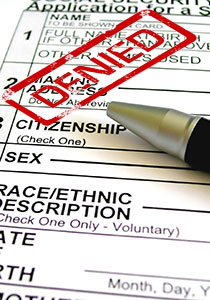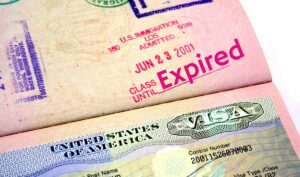
Each year the U.S. government admits thousands of foreign nationals as permanent residents of the United States. Permanent residence is symbolized with a card, most commonly referred to as a green card. But the government also denies thousands of green card applications. There are several possible factors for a green card application denial. The reasons vary from no basis for eligibility to grounds of inadmissibility to failure to properly deal with the application requirements.
Family-based green card cases have two major components. First, the U.S. family member must file Form I-130, Petition for Alien Relative, to establish a qualifying relationship with the foreign national relative.
Then, with an approved I-130 petition and availability of an immigrant visa, the foreign national may then apply for the green card through one of two paths: consular processing or adjustment of status. Consular processing refers to the application of a green card outside the United States at a U.S. embassy or consulate. Adjustment of status is the process of applying for a green card while inside the United States. Applicants use Form I-485, Application to Register Permanent Residence or Adjust Status. Not every applicant may adjust status.
RECOMMENDED: Family-Based Immigration in the United States
Denial Statistics
Each year U.S. Citizenship and Immigration Services (USCIS) denies thousands of green card applications. In fiscal year 2021, data shows that USCIS received a total of 757,206 petitions for alien relatives (Form I-130) and also denied 81,169.
During the same period, USCIS received 288,668 family-based applications to adjust status (Form I-485) and denied 44,181 applications. In fact, USCIS denied more than 16 percent of applications. This doesn’t include the 11 percent that USCIS routinely rejects. Family-based applications for a green card are based on a family relationship with a U.S. citizen or lawful permanent resident.
Ineligibility Reasons for a Green Card Application Denial

U.S. immigration law narrowly defines eligibility for a family-based green card. That means there is very little room for interpretation. The good news is that you can quickly determine if you are eligible for a family-based green card.
U.S. citizens and lawful permanent residents can petition for a limited list of family members. But not all family members are eligible for this privilege. U.S. citizens may petition a spouse, son, daughter, brother, sister or parent. A lawful permanent resident may only petition a spouse or unmarried son or daughter.
It is not possible to directly petition one’s grandparents, aunts, uncles, nieces, nephews, and more extended relationships through the family-based system.
Immediate Relatives
An unlimited number of immigrant visas (green cards) can be issued to immigrants who are immediate relatives of U.S. citizens. In other words, there is always an immigrant visa available for the spouse, unmarried child (under age 21) or parent of a U.S. citizen. Although there is “no wait” for an immediate relative immigrant visa, there is still a process that will most likely take several months. But rules apply to each relationship type. The immediate relative categories include:
- IR1: Spouse of a U.S. citizen (including same-sex couples whose marriage is legal in the state or country where it took place)
- IR2: Unmarried child (under 21 years of age) of a U.S. citizen
- IR3: Orphan adopted abroad by a U.S. citizen
- IR4: Orphan to be adopted in the United States by a U.S. citizen
- IR5: Parent of a U.S. citizen (who is at least 21 years old)
Petitioning a relative with an adoptive relationship can be tricky. The adoption must have taken place before the child reached the age of 16. All immigration rules governing natural parents and children apply to adoptive relatives, but there are some additional procedures to be followed. When petitioning a relative with an adoptive relationship, it’s generally best to consult with an immigration attorney.
Fiancé(e)s of U.S. citizens are also just a few steps away from a green card. The couple may get married outside the U.S., and then the foreign national spouse may apply as the spouse as a U.S. citizen. But if the fiancé is overseas and the couple wants to get married in the U.S., they must first apply for a nonimmigrant visa called a K-1 fiancé visa. After marriage in the permitted 90-day period, the foreign national spouse may adjust status to permanent resident.
Family Preference
The family preference categories for an immigrant visa include other relationships for U.S. citizens and lawful permanent residents. Congress puts numerical limits on immigrant visas for the family preference categories. In other words, a limited number of green cards are available to family preference applicants each year. Some categories will wait many years to get a green card. Immigration law prioritizes family preference categories in the following order:
- F1: Unmarried, adult sons and daughters (age 21 or over) of U.S. citizens
- F2A: Spouses and unmarried children (under age 21) of permanent residents
- F2B: Unmarried adult sons and daughters of permanent residents
- F3: Married sons and daughters (any age) of U.S. citizens
- F4: Brothers and sisters of adult U.S. citizens
If you don’t fit the immediate relative or family preference categories above, do not apply. USCIS will certainly deny the petition. Small lies and fabrications of the truth will complicate your problems. If USCIS determines that you lied, the green card application denial will adversely affect the intending immigrant’s future attempts to immigrate to the United States.
Inadmissibility Reasons for a Green Card Application Denial
Even if you fit an eligibility category, a ground of inadmissibility can cause a green card application denial. It goes without saying that immigration officials will deny a green card to spies and terrorists, but ordinary people with certain ailments and financial situations can also get denied. Applicants must demonstrate that they don’t pose a danger to U.S. society on financial, health, security, immigration violation, or criminal grounds.
Financial
The U.S. relative that sponsors you will need to show sufficient income or assets to support you at 125 percent of the U.S. poverty guidelines (in addition to supporting his/her own family). If you can’t support yourself, this measure helps to ensure that you won’t depend on government assistance. Generally, this ground can be overcome by submitting Form I-864 for family-based application.
Health
The U.S. government will also require you to get a medical examination conducted by a USCIS designated physician. The examination is required to establish that an applicant is not a public health risk such as a carrier of a disease that presents a public health risk, or having a dangerous physical or mental disorder. Generally, this ground can be overcome by submitting the results of a medical exam.
Immigration Violations
Your immigration history will be reviewed. Immigration officials will likely deny your green card application if you have overstayed a visa by six months or more, or if you have ever entered the country unlawfully. Immediate relatives who are present in the U.S. can generally adjust status after an overstay.
Criminal Record
You will certainly run into problems if you have committed certain crimes, like aggravated felonies, drug crimes, or acts of terrorism. In certain cases, a waiver may be available. Contact an immigration lawyer for assistance.
For a more comprehensive look at the various categories, see the grounds of inadmissibility. A waiver, a form of legal forgiveness, may be available in some cases, but these require careful analysis and documentation, best provided by an immigration attorney.
| Type of Inadmissibility | Waiver Available? |
| People with communicable diseases like tuberculosis | |
| People with physical or mental disorders that may cause harm to themselves or others | |
| Drug abusers or addicts | |
| Drug traffickers | |
| People without proper vaccinations | |
| People with convictions for crimes involving moral turpitude | |
| Prostitutes | |
| People who have violated immigration laws | |
| People with multiple criminal convictions | |
| Spies | |
| Terrorists | |
| Nazis | |
| People likely to become dependent on need-based government assistance |
Everyone who applies to enter the United States is checked for inadmissibility. If your situation may include any of the above conditions, please consult with an immigration attorney before attempting to file any USCIS form.
Application Mistakes Can Cause Green Card Denial
Obtaining a green card is not a simple matter of filling out a form. The collection of forms must be prepared carefully, and the applicant must file them in certain steps with specific supporting documents. The U.S. government may deny applications due to inconsistencies, mistakes, incomplete facts and failing to follow the directions. In some cases, immigration officials may perceive inconsistencies as lies and deny the green card application.
There are options for people that want help in the preparation process. CitizenPath’s affordable, online service helps people fill out the applications with simple directions and a process that checks for common errors. There’s live support and detailed instructions for your specific situation. CitizenPath will even guarantee that USCIS approves the green card application.
Immigration attorneys will also help applicants prepare forms with personal guidance through the process. Attorneys can also represent a client in court or more complicated cases. Of course, attorney costs can add up quickly.
Changes in Circumstances
I-485 applicants often forget that it is necessary to remain eligible after submitting the application. You must remain eligible throughout the process and until the green card is issued.
Depending on the basis of your application, a variety of factors may affect eligibility. Generally, you must remain in a lawful status. Marriage status, job status, and of course criminal activity can all potentially affect the application.
RECOMMENDED: Adjustment of Status Denial Due to Changes in Circumstances
Appealing a Denied Green Card Application
USCIS has been known to make errors, and even lawyers occasionally make a mistake that results in a denial. There is an appeal process, but many lawyers prefer to re-file the application. (Appealing a decision can end up costing more time and money.) Regardless, any case that initially results in a denial is more complicated. Get the help of an experienced immigration attorney to guide you through the process.
If you applied for a green card inside the United States (i.e. by filing Form I-485), you can file Form I-290B with USCIS to appeal the denied green card application. The appeal must be filed within 30 days of the notification of the decision (or 33 days if you received the notification by mail) along with the applicable filing fee.
If you applied for a green card outside the U.S. (i.e. through a U.S. consulate abroad), you will have to ask the principal consular officer to review your case. If the officer desires, he or she can get a second opinion from the State Department. However, if the office upholds the decision to deny a green card, there is no appeal available. Generally, you must start the case over again by refiling the I-130 petition.
About CitizenPath
CitizenPath provides simple, affordable, step-by-step guidance through USCIS immigration applications. Individuals, attorneys and non-profits use the service on desktop or mobile device to prepare immigration forms accurately, avoiding costly delays. CitizenPath allows users to try the service for free and provides a 100% money-back guarantee that USCIS will approve the application or petition. We provide support for the Petition for Alien Relative (Form I-130), Adjustment of Status (Form I-485), Citizenship Application (Form N-400), and several other immigration packages.
Note to Reader: This post was originally published on September 19, 2017, and has been modified with improvements.
Want more immigration tips and how-to information for your family?
Sign up for CitizenPath’s FREE immigration newsletter and
SAVE 10%
on our immigration services





